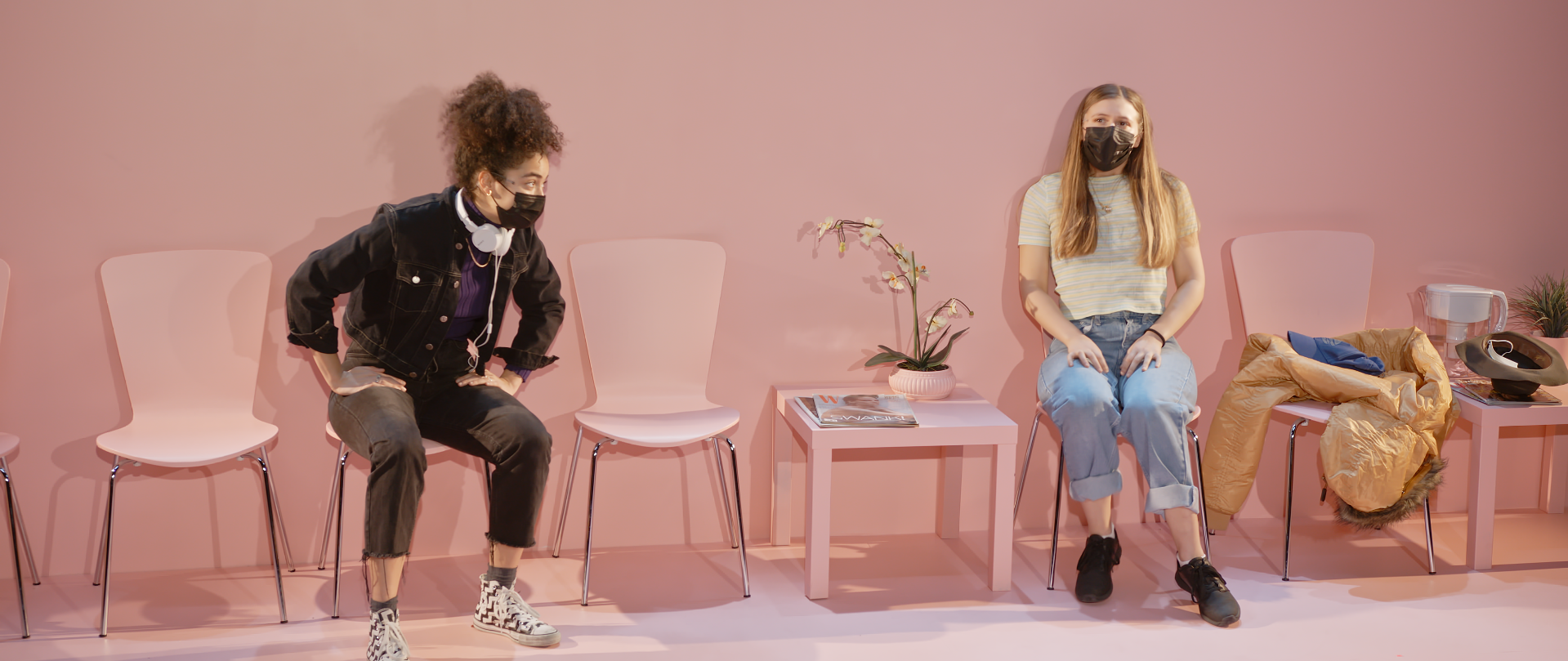Yale Cabaret presents “over easy”
Yale Cabaret’s basement theater transforms into an egg donation clinic for the production of “over easy”.

Courtesy of Andre Griffith
With a monochromatic pink stage teetering on the edge of fantasy and realism, Yale Cabaret’s small black box theater has been transformed into an egg donation clinic.
From Dec. 2-4, Yale Cabaret is presenting “over easy,” a play by Abaigeal O’Donnell. It is being produced in partnership with the People of Marginalized Genders, or PMG, student affinity group at the David Geffen School of Drama. The play follows the journey of four women going through the process of donating their eggs.
“If you go around to those different bulletins by the Sterling library, there’s usually a flyer saying something like ‘Ivy League Donors Wanted,’” Chloe Knight DRA ’24, co-leader of PMG said. “So we really thought this was something that could speak to our affinity group as well as to the Yale community beyond the School of Drama.”
The People of Marginalized Genders student affinity group — which was originally called “Womxn’s Voices in Theatre” — is led by Sarah Scafidi DRA ’23, Anna Grigo DRA ’22 and Knight. According to Knight, it exists to create community among students dealing with myriad gender issues, and is inclusive of cis women, trans women, nonbinary and gender non-conforming students. At the beginning of the semester, Sarah Cain DRA ’22, artistic director of the Cabaret, contacted all eight affinity groups at the Drama School to offer them the chance to collaborate with the Cabaret. Having reemerged from a pandemic-imposed virtual school year, Cain wanted to use the Cabaret to make creative connections and build community.
The co-leaders of PMG searched for existing plays that related to sexual health and reproductive health. Knight discovered “over easy” while helping a friend practice lines for a New York-based production of the play. She believed it aligned with PMG’s mission to represent people of marginalized genders and the issues affecting them.
“A lot of the language surrounding [the egg donation process] treats the donors as objects, as if they’re only there to donate,” cast member Elsie Harrington ’25 said. “They’re putting their bodies through hormones, discomfort and surgery, and they’re not really given the credit that they deserve.”
The play takes place mainly in the waiting room of the egg donation clinic, located in an unnamed big city. The four characters — Katie, Taylor, Marissa and Charlotte — are all in their 20s. According to Sami Cubias DRA ’23, this play highlights many experiences that marginalized people may have. The show covers not only the experience of being an egg donor, but also the perspective of a someone who has trouble conceiving, the struggle of conceiving and having a miscarriage or getting pregnant and then seeking an abortion.
Throughout the play, the different layered reasons for being an egg donor are dissected and developed. The surface-level reasons for characters’ decisions appear to be simple — some need money to pay student loans and others want to have agency in their lives — but through the difficult reality of the process, their motivations gain dimension. “over easy” explores the reality that egg donation is an emotional, heavy decision to make at such an early point in the characters’ lives. Cubias believes that the play does a great job of balancing the serious issues with humor.
“At its best, humor can make you laugh and then the next second it makes you cry,” Cubias said. “It’s a way for the audience to build empathy for the characters before they get a sense of their inner turmoil.”
The play features a fully monochromatic pink set with a minimalist assortment of props. According to Scafidi, the play’s director, co-leader of PMG and managing director of Yale Cabaret, the set is designed to be slightly uncanny and strange. It matches the moments of the show that exist outside of reality.
Throughout the play, moments of levity and surrealism are conveyed through dance. Scafidi commented that choreographer Juhee Kim DRA ’23, who goes by KIMKIM, built meaning into every movement. To represent scenes where egg donors inject themselves with hormones, KIMKIM designed funky, floaty dances that play with reality.
Dramaturg Gabrielle Hoyt DRA ’24 compiled a folder of resources to help the cast portray the process realistically. Cast members studied the process of donating eggs, what the hormones would “trick their bodies to think about” and the relationships donors would maintain with both the people using their eggs and the service handling the donation. O’Donnell also supplied the team with research she conducted while writing the play.
Scafidi explained that while the Cabaret usually does a full dinner service before shows, due to COVID-19 policy, they are instead opening an outdoor garden bar before each performance. Although the Cabaret usually seats 80 people, COVID-19 restrictions are limiting the show to 60 live audience members.
Knight commented on the unique experience cultivated in the small blackbox theater.
“The Cabaret has energy in that it’s a little scrappy, everyone’s really talented and we come here to make something fun and beautiful,” Knight said. “That kind of primal urge to make art is in all of us together.”
“over easy” is the fifth show out of six being produced by the Yale Cabaret this semester. Tickets can be purchased on the Cabaret website.







